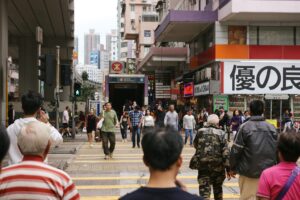
By Ollie Campbell, PPE Student at Warwick University
During the first wave of the pandemic, China stood head and shoulders above everyone else in its economic resilience, consistently staying in positive growth. Now, the world’s second-largest economy is beginning to look very vulnerable. After a clampdown on financial excess, the property market, China’s most important accounting for up to 1/3rd of GDP, has suffered. This has begun to stunt its quick growth in combination with its pandemic response. The quick extinguishing of Covid outbreaks is only getting harder and costlier to sustain.
Now, neither of those had any impact on China in 2021 as it still managed a GDP growth of over 8%. As factories and warehouses have shut down across the world, China’s exports have boomed, especially as consumers in developed countries have spent their extra cash -mainly from stimulus packages and job retention schemes- buying imported goods. In dollar terms, China’s GDP has exceeded pre-pandemic forecasts as the yuan has strengthened in the last year. As these growth methods cannot be repeated year on year, China needs to assess some of its problems rather than just pushing its citizens to work harder under tighter regulations.
In China’s defence, they are getting their macroeconomic policy response mostly right. New, hard-line policies trying to clamp down on dangerous property excesses are helping to avoid a crisis. Stricter borrowing limits have restricted overextended developers. This has momentarily damaged the growth of the property sector as homebuyers get more uneasy assuming a house they have pre-bought will no longer be built. Yet this should make the property market in China much more sustainable in the long run, something China will soon see the benefits of especially as they may well be avoiding a large economic crash. The Government’s most recent rhetoric has been an attempt to keep property prices low. Mortgages have got partially cheaper and federalised city policy has made some areas of property easier to purchase bureaucracy-wise.
Not wanting to miss out on any potential economic progress, Beijing is taking strides to maintain the broader economy. They have managed to speed up several major public-investment projects and have pushed for local government officials to issue more infrastructure bonds to help with continual development.

Despite China’s loose Government control on macroeconomic policy, they have successfully stuck to a strict Covid defence. The government has idolised the success of its pandemic response as proof for China‘s superior social model. Without taking away any credit from this current success, this could impair the fresh thinking required to tackle the fast-evolving pandemic. Even before Omicron, so far the variant causing the most cases, the potential risks of aiming for a low case strategy were clear. Certain countries across the world, such as Australia and New Zealand, have suffered from this in that lockdowns need to be put in place immediately whenever cases arise for their plans to be effective. The downfalls of this approach can be critical. Xi’an, a Chinese megacity, failed to lockdown quickly enough after a Delta outbreak which led to a forced lockdown so strict that there were large food shortages across the area. The irregular restrictions that the Chinese Government have sporadically put in place have damaged consumer spending. December retail sales in China shrank compared to a year prior.
As each variant gets more and more transmissible, Zero-Covid is going to get harder to maintain. The cases will rise and so more people will be at risk, especially as more people get Covid asymptomatically. As a result, mass testing has occurred across China, mostly in the city of Tianjin. But this too has had its costs. Huge numbers of people are being forced to self-isolate from coming into contact with confirmed cases, enough that Volkswagen and Toyota have been forced to pause car manufacturing in the city.
Obviously, China can’t make any drastic changes to their Covid policy overnight, but they need a more sustainable route before the costs become extreme. The Nationalist approach of the Government is causing some avoidable issues, mainly through their vaccine scheme. Should China just accept the Western developed vaccine, of which there is enough doses of and offers a lot more protection, the hospital system will benefit massively. Due to the huge populace of China and their high population density, the healthcare system will have to be able to cope with vast amounts of people falling ill at the same time, which will eventually occur as a variant (even a milder one) spreads through the whole population.
The Chinese approach to both the property market and their pandemic response perfectly reflects their government style; acting fast and never admitting defeat or that they were/are wrong. Campaigns across China create huge momentum as slogans and propaganda spread across the country like wildfire. In terms of Covid response, this can be very beneficial but the overzealous efforts to restrain the property market almost managed to sink the whole economy. If the Chinese government can realise that their Covid protocols may share the same destiny as their property market policies almost did, they may not fall off the economic growth train just yet.
Ollie Campbell
I’m Ollie Campbell, a current undergraduate PPE student at the University of Warwick. I am interested in political journalism and analysis especially on the economic side. As an aspiring politician I spend a large amount of free-time studying the workings of politics and am a member of the Conservative groups both at Uni and at home.
Hi, the picture of this article is a street shot of Japan, as the characters on the billboards are in Japanese, not Chinese.